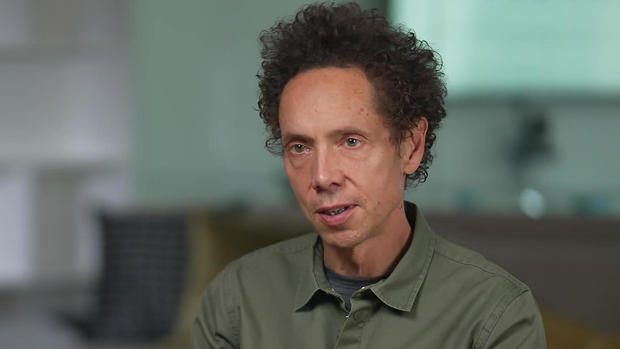Malcolm Gladwell on "The Bomber Mafia"
It's been five years since Malcolm Gladwell and "Sunday Morning" contributor Kelefa Sanneh were in the same room – on the set of "The Jim Gaffigan Show."
"We were acting!" said Gladwell.
"Playing ourselves, playing New Yorker writers in a scene on that show," Sanneh said.
But that's just Gladwell's day job. Sanneh noted, "You have a lot of titles: Magazine writer, bestselling author, media mogul. The one that's most impressive to me, if I'm being honest, hit country music songwriter."
"Wait, I wrote a country music song?" Gladwell laughed.
"You did! It's called '10,000 Hours,' by Dan + Shay, featuring Justin Bieber. It went to number one on the country chart."
OK, technically Gladwell didn't write it, but the song was based on an observation in his third book, "Outliers," that it takes 10,000 hours to master something difficult. "There's this notion we have that you can burst out of the gate and be fantastic at something complicated at a very young age – it's just not true," he said.
Sanneh asked, "What was it like for you to watch this concept of 10,000 hours break free from the chains of this bestselling book you'd written and just be everywhere?"
"It's always fun to see your ideas out in the world. Even if they're not in the form that you would necessarily intend! That's the goal, right, when you write a book, is you want your book to be talked about."
His talked-about and bestselling books have made Gladwell an industry, and an international phenomenon who can make up to a quarter of a million dollars for giving a speech.
"Well, I have infamously said, 'I would rather be interesting than correct.' And I think that's right. Judgments about correctness are made after the fact. So, a writer who is concerned with always being right would never write. So, I think a writer's job is to be interesting – that is to say, to raise questions that need raising, to give people the tools to think through difficult subjects."
He also thinks through some of those difficult (and not-so-difficult) subjects on his top-rated podcast, "Revisionist History," which is beginning its sixth season this week.
He said, "'Revisionist History' treats ideas as things that are worthy of our time, our effort, our consideration. Good ideas, to me, are like beloved friends. You wanna hang out with them. You wanna have conversations with them. You wanna argue with them. You wanna go for walks with them. I think we need more of that in the world."
Now, he's rethinking the audiobook. "The audiobook, historically, was an afterthought. You just read your book into a microphone. But our thought was, that seems crazy."
His latest, "The Bomber Mafia," is produced by his own audio production company, Pushkin Industries. "There's so much more possibility in audio," he said. "Let's use sound effects. Let's have musical scoring, Let's make it an experience."
Hear an excerpt from "The Bomber Mafia" audio book:
"The Bomber Mafia" explores the firebombing of Tokyo, which led to the end of World War II.
Gladwell said, "I went to this little museum that commemorates the night of March 9, 1945, when the U.S. Air Force napalmed Tokyo. Burned 16 square miles of Tokyo down in a matter of hours. And I was just so moved by this museum that I wanted to know, how did the United States come to the point where they dropped tons and tons of napalm, and burned tens of thousands of people alive?"
He learned about an effort, beginning in 1930, to prevent wartime mass killings and destruction. "The story's about this group of people who think they can reinvent war. They can use technology, for the first time in history, to drop a bomb with precision."
"It could be a little more surgical, a little more precise?" asked Sanneh.
"Yes. Exactly. But the Bomber Mafia weren't just interested in being better bombers. They were interested in being better people. 'Cause they said, 'Look. If I can drop bombs with unerring accuracy, I don't have to bomb civilians anymore.' And that was their dream."
The military spent billions (in today's dollars) building a precision bombing machine. The problem? It didn't work. The Air Force gave up on precision bombing in favor of brute force. Sanneh asked, "So, there is this idea that war can be more humane, this idea fails, the Air Force decides to basically just set Japan on fire instead? What's the moral of this story?"
"I don't think that this book is about deciding who was right," Gladwell said. "I want people to appreciate the impossibility of the choice."
Why now? "Well, because we're pretty quick off the mark these days to judge others whose situations we don't entirely understand. I thought it'd be really useful to force people not to do that."
Force people not to make quick judgments? That may surprise anyone who remembers Gladwell's 2005 bestseller, "Blink: The Power of Thinking Without Thinking."
Sanneh asked, "Is it wrong of me to perceive in this a kind of an anti-'Blink' approach? You're the guy who wrote the power of thinking without thinking."
"Well, now, wait a minute: 'Blink' was a book that was intended to showcase the power of snap judgments for both good and ill, right? 'Blink' argued there are certain times and places where your snap judgment is useful. But it's probably a pretty short list."
He says he's comfortable with what he calls "thinking in public." "There's a group of people now who I think understand what I'm doing, who are my audience. They like the experience of thinking along with me in public."
"Are you cancel-proof?"
"Well, no. I'm not immune from people being angry with things that I say or write, and wanting me to go away. But that's been true for a long time!"
Malcolm Gladwell has gone from magazines to books to podcasts. For him, the best way to stay interesting is to stay a moving target.
Sanneh asked, "Do you still think of yourself as someone who wants to, sort of, shift phases every decade or so?"
"I'm running out of shifts!" Gladwell replied.
"I'm not sure you are running out of shifts."
"I'll do this for a while. But I do love the feeling, you know, that feeling of reinvention is a very important one, that idea that you're waking up to do something that's new."
For more info:
- gladwellbooks.com
- "The Bomber Mafia: A Dream, a Temptation, and the Longest Night of the Second World War" by Malcolm Gladwell (Little, Brown), in Hardcover, eBook and Audio formats, available via Amazon and Indiebound
- "Revisionist History" (podcast)
Story produced by Mary Raffalli. Editor: George Pozderec.





